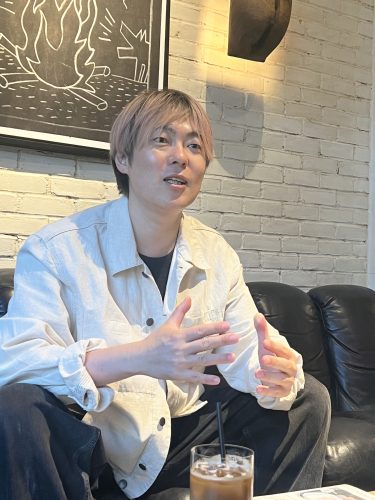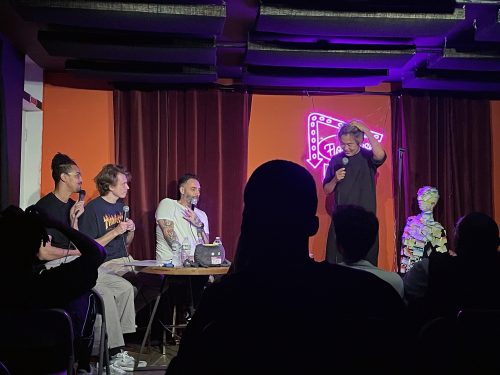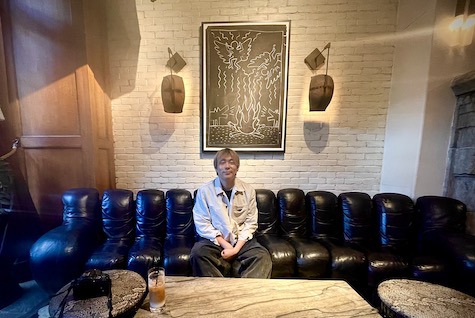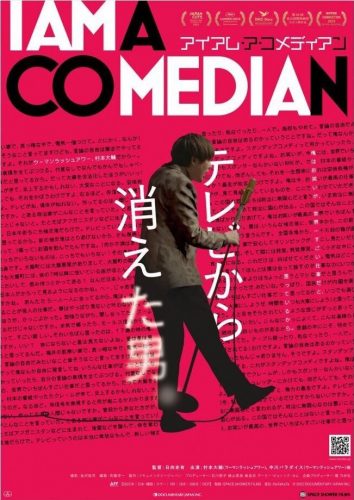
BOUT. 323
Daisuke Muramoto
Alone in New York, try his hand at comedy scenes.
Daisuke Muramoto has won numerous famous comedy contests in Japan as a duo comedy group, Woman Rush Hour. He has a brilliant track record as a comedian, but earlier this year, he came to New York City to become a stand-up comedian. Why the US? Why stand-up comedy? He has left his reputation behind to take on a new challenge. (Interviewer: Yoshiaki Takahashi)
It has been three months since you came to the US. How is life in New York?
Muramoto To be honest… a wave of homesickness has hit me now… (laughs). When I don’t perform in comedy clubs, I spend the whole day in a café thinking up stories, and when I can’t come up with anything, I go home with nothing… You know, there’s a saying that “Take the fortune by the forelock”. I don’t want to miss that fortune, So, I’m keeping doing something.
Ha ha ha.
Muramoto Oh, it’s night already without doing anything again! And. Monday already? Like It’s been a week of nothing.
Are you impatient?
Muramoto It’s hard. Every Tuesday, Thursday, and Saturday, I have the open mic at the comedy club. But I only have five minutes to perform – five minutes out of the 24 hours in a day. Until then, I work on my script during the day. Then I show up for those five minutes at night. At that moment, I am there as a comedian. I’m there because of the laughter. It’s like I’m alive for those five minutes.
It’s numbing.
Muramoto But other than that, I’m very low-key. I live alone all the time and think of stuff to mumble about. I don’t make eye contact with anyone, only the homeless say “Give me money.” It’s like being invisible.
I enjoy the process of making people perceive me as an interesting guy.
(laughs). When you walk down the street in Japan, you get asked to get an autograph and over here, someone says, “Give me five dollars! to you!
Muramoto I’m nobody in this city, and even on stage. Sometimes audience suddenly get up and leave when I’m on stage. If I’m in Japan, people stay.
So everything is different.
Muramoto I’ve already started with the ‘boring, katakana-speaking guy (not fluent) came out’. They look at me like I’m some kind of poor guy.
First of all, the language barrier is very difficult.
Muramoto When I go to the ethnic restaurant, I tell the waiter “I don’t want cilantro”, but they put it in. I showed them a picture (and explained), then I kept saying “No cilantro, no cilantro, no cilantro”… and finally they said ‘OK’, but still in. No matter what I said, they said OK, OK. But still…
I, too, have lived in this city for a quarter of a century, but “cilantro” is hard…(laughs)
Muramoto (laughs) But when I get a big bang on the stage and the audience says, “You were funny!”, then I get so high.

Are you even happier than when you were popular in Japan?
Muramoto I start from a place where nobody knows me, the process of getting people to recognize me as an interesting guy… it’s a lot of fun!
Is it similar to working your way up from being an unknown youngster to being famous?
Muramoto I was born in the countryside of Fukui Prefecture and went to Osaka to become a comedian. I fought against the Kansai people’s preconception that a guy from Fukui wouldn’t be funny, and I’m still fighting against the prejudice that jokes are made by Asians. It’s the same thing.
Your artistic history is a history of fighting all your life, isn’t it?
Muramoto It might be, yes, it is. I’m still fighting now (laughs). The other day, I went to one of the comedy clubs and approached the manager that I wanted to be on the stage, but he was like, “I’ll wait and see how good you are……” All the other comedians were also brushed off by him.
Oh…
Muramoto When I had a chance to perform at the famous comedy club ‘The Stand’, the manager who treated me was the last performer of the day. He happened to see my performance and afterwards, he said “Hilarious!, Are you free on the 26th at 10 pm? Will you come?” And he gave me a 10-minute slot.
You were like, Yes!
Muramoto Right! I’m going beyond Asians… I mean. I want people to think this guy is funny.
What are the differences in comedy between Japan and the USA?
Muramoto First of all, the audience is different. For example, over here, if a comedian makes a joke about current affairs, Israel or Palestine, etc.., an old man and a young girl in the audience yell, “You put down the microphone and get out of here right now”. The comedian retorts in anger, but I don’t think there are any audiences like that in Japan.
Comedy is more unstable than stable, a bit like art.
You probably have been asked this question hundreds of times, but why did you, a successful comedian like you, throw all your fame away and start again in NYC?
Muramoto Hmmm ………. after all…, I’m a comedian. I want to make people laugh with my stories. In Japan… Rather than competing with stories… when you get older, 30th, 40th, you start talking about stable techniques to make people laugh.
I see…
Muramoto I think I became funny probably because I kept changing my environment. I went from Fukui to Osaka, where I first met my competitors … I saw the styles of various comedians. Then, I moved to Tokyo and met many famous comedians. If you stay in the same place, you end up focusing more on technique than on sense and substance. If I stayed in Tokyo for many more years, I would have become a “stable technical comedian”. People would say, “When you become a veteran, you can be watched with stability”. I think comedy is more unstable than stable, and I also think it’s a bit of an art form.

So, you chose challenge over stability.
Muramoto After all, everyone has to go somewhere new. To begin with, I quit high school and jumped into the world of comedians. Rather than jumping into security, I jumped into insecurity and got security from that. I always rotate dive in. No one becomes a comedian for stability.
They may be there now.(laughs)
Muramoto Indeed (laughs). But you know, in my early career in Japan, I was an unknown comedian, When we, Woman Rush Hour(Muramoto’s duo group), made the audience laugh and get applause, it was a joy. …… Yeah, I think it’s similar to the feeling I have now. I was a nobody and I made the audience laugh in English. People would come up to me and say, ‘You were funny’. And if they say, “No, there are a lot of guys in America who are even better than you”, then I go, “Oh, well, let’s see what can I come up with next.”… It’s very moving when people from different cultures, different languages, and different skin colors laugh at my comedy, isn’t it?
Stability does not get you there, and that is the unique catharsis of being a comedian.
Muramoto Ultimately, I want to be able to create a compelling story rather than just speed and good language. I want to accumulate good artistic hours. There is the soil of society, and I want to absorb a lot of things from it and enjoy with age the conversations that only a 40-year-old can have, or the jokes that only a 50-year-old can make. If I grow roots in this American soil and absorb a lot of things, I can make my own stories.” I want to make jokes that make people think, ‘Oh, that was a good use of my time’.
Now, you look enjoying yourself.
Muramoto Yeah …… it’s fun. Making stories, thinking about stories… This is what being a comedian is all about. I probably wouldn’t have understood that feeling if I hadn’t actually come here. In the end, it all depends on you… When I went to the bank by myself and left crying because I couldn’t get what I needed, and I’ve been told many times not to put the cilantro, but I still get served.
Finally, please give a message to our readers who live in the US?
Muramoto When I was about 30 years old in Osaka, my senior said to me, “You’re going to Tokyo, that’s great. I’m too old for that now”. People like that keep saying for the rest of their lives and keep making up reasons not to do it. Before I came to New York, I was asked so many times like, “Are you sure you’re going to New York, even you don’t understand English?” I didn’t go through Japanese language school before I was born. The older I get, the more I look for things that make me anxious. You watch the news and say, ‘Asian hate’, ‘the Japanese yen dropped, ‘after the pandemic’… Next thing you know, you get too old to do anything …… Young or old, it doesn’t matter, if you dive in, you can manage. I had no regrets when I left Fukui, when I left Osaka, and when I left Japan. I came out of my mother’s nest to venture out into this world, so I want to continue to venture out and be thrilled. Yes, it’s good to be thrilled.

@ The Ludlow New York City
Daisuke Muramoto : comedian
Born in Ooi-machi, Fukui Prefecture, he formed the comedy duo Woman Rush Hour with Nakagawa Paradise in 2008. As an MC on Abema TV, they became involved in news reporting, which led to them performing manzai on political and social issues. However, he questioned the attitude of TV stations, which considered “political statements” as taboo and tried to avoid them, and in pursuit of free expression, he decided to change his style from manzai to stand-up comedy, and to move to the New York, the home of stand-up comedy, where he has been performing since February 2024.
◇ ◇ ◇
X:@WRHMURAMOTO
Instagram:
@comediandaisuke
@muramotodaisuke1125
メルマガ:https://shorturl.at/23ldq
◇ ◇ ◇
Documentary film
[I Am a Comedian]
The Man Who Disappeared from TV.

After winning a 2013 Manzai competition with his partner (performing together as Woman Rush Hour), standup comedian Daisuke Muramoto begins using his act to address politically verboten social issues. Before long, the pair’s television opportunities disappear—a consequence of the widely understood but unwritten rule that comedians making political comments in Japanese media are simply “not tolerated.” In this intimate documentary, director Fumiari Hyuga (Tokyo Kurds, JC2019) follows Muramoto for three years as he continues to challenge the status quo as a comedian while facing the added challenges of his father’s disapproval and a worldwide epidemic.
Dir. Fumiari Hyuga, 2022, 108 min., DCP, color, in Japanese with English subtitles. With Daisuke Muramoto.
SPACE SHOWER FILMS
Official Site:https://iamacomedian.jp
〈interviewer〉
Yoshiaki Takahashi
Born on September 8, 1973. Born in Okayama Prefecture. As an interviewer for “New York Biz” ,he has interviewed more than 1,000 celebrities, including U.S. presidents, major leaguers, Hollywood stars, athletes, musicians, idols, politicians, and businessmen. He has conducted interviews on the front lines of the world and delivers the living words of successful people. He also gives lectures to companies and individuals who want to expand their business overseas, and coordinates events for companies wishing to expand their business to New York. He is the author of “Buki wa hashirinagara hiroe”, “8 Success laws taught by 1000 people who challenged New York”.
(Published in July 6, 2024 issue)



